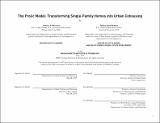The Frolic Model : transforming single-family homes into urban cohousing
Author(s)
Morrison, Joshua I. H.; Knox, Tamara Garfield.
Download1140508127-MIT.pdf (22.44Mb)
Other Contributors
Massachusetts Institute of Technology. Department of Urban Studies and Planning.
Massachusetts Institute of Technology. Center for Real Estate. Program in Real Estate Development.
Advisor
Dennis Frenchman.
Terms of use
Metadata
Show full item recordAbstract
We founded the development firm Frolic to respond to the following questions: Can we introduce the benefits of density to urban America without displacing the people who live there? Can we bring the comfort of permanence and planting roots to the non-wealthy? Can we build places that make daily life easier, more affordable, and more enjoyable? This thesis articulates the Frolic Model developed through the DesignX incubator at MIT with input from over 40 developers and city staff working in major cities across the U.S. "Frolic" is an Amish term referring to shared labor and common vision, used to describe joyous festivals in which over 100 families would come together and raise a barn in one week. In our research, we found that there are several potential mutual gains lost in the current housing development paradigm - between property owners, investors, developers, community members, and future residents. By restructuring the development process around mutual gains, the Frolic Model brings the benefits of homeownership to a broader population, while allowing smaller, more intimate development projects to become viable. The three principles of the Frolic Model are cooperative financing, co-development, and cohousing. The cooperative financing structure enables crowd-investing and a decoupling of share ownership and tenancy. This allows residents to act as long-term tenants of a project without requiring a large down payment or a personal mortgage. It also allows others in the neighborhood to buy shares in the project and invest in a tangible, low-risk, low-return community asset. Over time, low wealth residents can purchase more shares and build additional equity in their home. Partnering with land owners to co-develop their property, we allow them to avoid displacement and financially benefit from redevelopment. Through elements of cohousing, we create infrastructure for community and improve affordability through shared amenities.
Description
This electronic version was submitted by the student author. The certified thesis is available in the Institute Archives and Special Collections. Thesis: M.C.P., Massachusetts Institute of Technology, Department of Urban Studies and Planning, 2019, (For Joshua I.H. Morrison and Tamara Garfield Knox) Thesis: S.M. in Real Estate Development, Massachusetts Institute of Technology, Program in Real Estate Development in conjunction with the Center for Real Estate, 2019, (For Tamara Garfield Knox) Cataloged from student-submitted PDF version of thesis. Includes bibliographical references (pages 59-62).
Date issued
2019Department
Massachusetts Institute of Technology. Department of Urban Studies and Planning; Massachusetts Institute of Technology. Center for Real Estate. Program in Real Estate Development; Massachusetts Institute of Technology. Center for Real EstatePublisher
Massachusetts Institute of Technology
Keywords
Urban Studies and Planning., Center for Real Estate. Program in Real Estate Development.